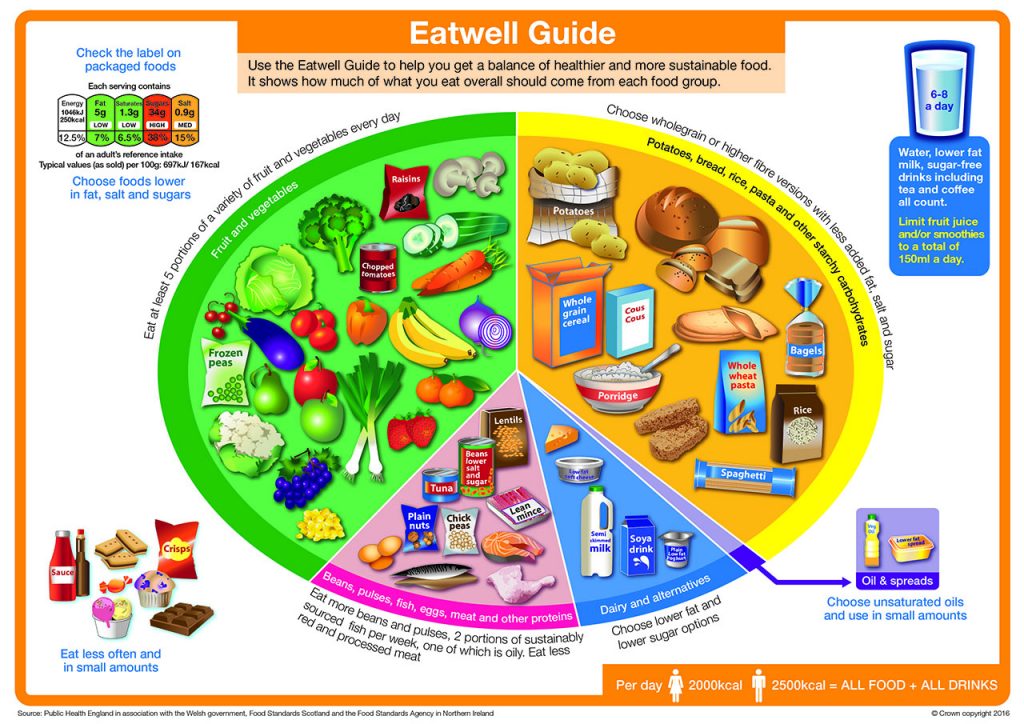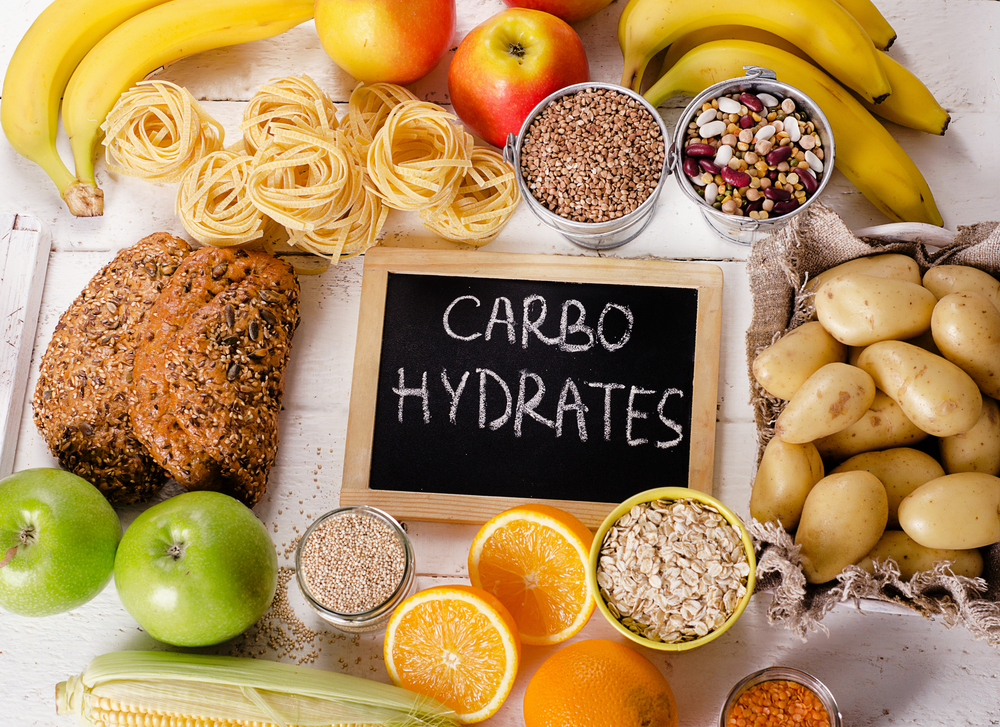What they are?
How much should we be eating?
Why they are Important?
Please see link at the end of this post to the Zoom talk
Carbohydrates are compounds that are found in living things. Their molecules are made up of carbon, hydrogen and oxygen atoms. Hence the name CARBOHYDRATES. They are an important source of energy for the body in a healthy diet, with starchy and sugary foods being classed as high in carbohydrates. There is also evidence to show that the type of carbohydrate consumed can affect risk of certain diseases including heart disease.
For dietary purposes, carbohydrates have also been described in the following way:
Sugars
Intrinsic sugars, which are incorporated into the cellular structure of foods, e.g. sugars in whole fruits and vegetables. Extrinsic sugars, which are not bound into a cellular structure, e.g. the lactose (milk sugar) in dairy products. Honey, fruit juices, table sugar and confectionery.
Complex carbohydrates
Starch, Starch is found in foods that come from plants. Starchy foods, such as bread, rice, potatoes and pasta, provide a slow and steady release of energy throughout the day. Dietary fibre is neither digested nor absorbed in the small intestine. Fibre is found in the cell walls of foods that come from plants. Good sources of fibre include fruit and vegetables, wholegrain bread, wholewheat pasta, and pulses (beans and lentils). Fibre is important for keeping your digestive system healthy
Carbohydrates in the diet
The total of all carbohydrates in the diet includes all starch, sugars and dietary fibre. The dietary reference value for carbohydrates be maintained at a population average of approximately 50% of total dietary energy (calorie) intake. 30g of this energy intake should be from for dietary fibre for adults , the daily reference value use to be 18g/day but was increased in 2015 due to health benefits. The sugar part of carbohydrate daily intake should not exceed 5% of total dietary energy.
What is an ideal daily calorie intake?
An ideal daily intake of calories varies depending on age, metabolism and levels of physical activity, among other things. Generally, the recommended daily calorie intake is 2,000 calories a day for women and 2,500 for men.
The definition of free sugars are:
Included:
- all monosaccharides and disaccharides added to foods by the manufacturer, cook or consumer, plus sugars naturally present in honey, syrups and unsweetened fruit juices.
- fruit purees and pastes and vegetables in pureed and juice form.
Excluded :
- lactose (milk sugar) when naturally present in milk and milk products.
- sugars contained within the cellular structure of foods (particularly fruits and vegetables).
According to the National Diet and Nutrition Survey (NDNS) DATA FREE SUGARS: in Years 7 and 8 (combined) (2014/2015/16). In all age groups, mean intake of free sugars exceeded the government recommendation of providing no more than 5% of daily total energy intake. With children, girls aged 11 to 18 years had the highest free sugar intake as a percentage of total energy (14.4% of total energy).
How much carbohydrate should be on my plate?
The government’s healthy eating advice, illustrated by the Eatwell Guide, recommends that just over a third of your diet should be made up of starchy foods, such as potatoes, bread, rice and pasta, and over another third should be fruit and vegetables. This means that over half of your daily calorie intake should come from starchy foods, fruit and vegetables.

Why do we need carbs? Energy
Carbohydrates should be your body’s main source of energy in a healthy, balanced diet. Starchy carbohydrates provide an important source of energy:1 gram provides 4 kcal (16 kJ) They’re broken down into glucose (sugar) before being absorbed into your blood. The glucose then enters your body’s cells with the help of insulin. Glucose is used by your body for energy, fuelling your activities, whether that is going for a run or simply breathing. Unused glucose can be converted to glycogen, which is found in the liver and muscles. If more glucose is consumed than can be stored as glycogen, it is converted to fat for long-term storage of energy. Starchy carbohydrates that are high in fibre release glucose into the blood slower than sugary foods and drinks.
The body’s tissues require a constant supply of glucose, which is used as a fuel. The main source of glucose is dietary carbohydrate, but it can also be synthesised from protein. If the diet is low in carbohydrate, a greater percentage of dietary protein is used to provide glucose, which means less is available for the growth and repair of body tissues. Thus, carbohydrate in the diet has a protein-sparing effect.
DISEASE RISK: FIBRE Why is it important?
Fibre is an important part of a healthy, balanced diet. It can promote good bowel health, reduce the risk of constipation, and some forms of fibre have been shown to reduce cholesterol levels. Research shows diets high in fibre are associated with a lower risk of cardiovascular disease, type 2 diabetes and bowel cancer. Many people do not get enough fibre. On average, most adults in the UK get about 19g of fibre a day. Adults are advised to eat an average of 30g a day. The recommended fibre intake for children can vary from 15g to 30g, depending on their age.
Should I cut out carbohydrates?
Carbohydrates are the body’s main source of energy. In their absence, your body will use protein and fat for energy. It may also be hard to get enough fibre, which is important for long-term health. Healthy sources of carbohydrates, such as higher fibre starchy foods, vegetables, fruit and legumes, are also an important source of nutrients, such as calcium, iron and B vitamins. If you significantly reduce carbohydrates from your diet in the long term could mean you do not get enough nutrients, potentially leading to health problems. Replacing carbohydrates with fats and higher fat sources of protein could increase your intake of saturated fat, which can raise the amount of cholesterol in your blood – a risk factor for heart disease. When you are low on glucose, the body breaks down stored fat to convert it into energy. This process causes a build-up of ketones in the blood, resulting in ketosis. This can cause headaches, weakness, feeling sick, dehydration, dizziness and irritability.
KEY POINTS
- Carbohydrates are an important source of energy in a healthy diet.
- For dietary purposes, carbohydrates have also been described as sugars and complex carbohydrates.
- the dietary reference value for carbohydrates be maintained at a population average of approximately 50% of total dietary energy intake, with 5% from free sugars
- In all age groups, mean intake of free sugars exceeded the government recommendation of providing no more than 5% of daily total energy intake
- dietary reference value for dietary fibre for adults 30g/day
- Fibre is an important part of a healthy, balanced diet. It can promote good bowel health, reduce the risk of constipation, and some forms of fibre have been shown to reduce cholesterol levels.
- Research shows diets high in fibre are associated with a lower risk of cardiovascular disease, type 2 diabetes and bowel cancer.
- Significantly reducing carbohydrates from your diet in the long term could mean you do not get enough nutrients, potentially leading to health problems.
Thank you for reading
Here is the recording as well
Fiona Waring
Fiona Waring
Dip Nut, BSc.(Hons), MSc PHN, ANutr
Nutritional Therapist
M: +44 07957 267 964
eatyourgreens@fionawaring.com
‘Registered with the Association for Nutrition – www.associationfornutrition.org
Protecting the public and promoting high standards in evidence-based science and professional practice of nutrition.’
